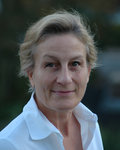Page path:
- Press Office
- Press releases 2013
- 15.11.2013 Nicole Dubilier appointed Director a...
15.11.2013 Nicole Dubilier appointed Director at the Max Planck Institute in Bremen
Nicole Dubilier appointed Director at the Max Planck Institute in Bremen
Research on symbioses in the oceans
Prof. Dr. Nicole Dubilier has been appointed Director at the Max Planck Institute for Marine Microbiology in Bremen. Prior to her appointment she was the Head of the Symbiosis Group at the MPI Bremen. Her research focuses on chemosynthetic symbioses between microorganisms and marine invertebrates. These symbioses are widespread in the world’s oceans and form the basis for highly productive ecosystems at hydrothermal vents and cold seeps in the deep sea. Nicole Dubilier was recently awarded an European Research Council Advanced Grant of € 2.5 million by the European Union. Her directorship began on September 1st, 2013.
Chemosynthetic symbioses were first discovered in 1977 at deep-sea hydrothermal vents off the Galapagos Islands. Researchers discovered highly productive symbiotic communities at the vents that gain their energy from chemical energy instead of from photosynthesis. Nicole Dubilier: “We now know that these symbioses are not limited to the deep sea but also occur in more easily accessible environments. In our research we work on symbioses from both deep-sea and shallow-water environments, and our collection sites range from deep sea hot vents and cold seeps to less exotic environments such as Mediterranean seagrass beds and sand flats in the North Sea.”
Nicole Dubilier is also a Professor for Microbial Symbiosis at the University of Bremen and a Coordinator of the Research Area Geosphere-Biosphere Interactions at the Center for Marine Environmental Science (MARUM) in Bremen. Nicole Dubilier: “I am very much looking forward to my new responsibilities. The Symbiosis Department will use a wide range of both existing methods and new techniques to investigate the biology, ecology and evolution of chemosynthetic symbioses, and we will profit immensely from in-house collaborations with colleagues from the three other MPI Departments as well as from the MARUM and the University of Bremen.“
More information
Dr. Manfred Schlösser
Max-Planck-Institut für Marine Mikrobiologie, Celsiusstraße 1, D-28359 Bremen,
Phone: 0421 2028-704, E-Mail: [Bitte aktivieren Sie Javascript]
Research on symbioses in the oceans
Prof. Dr. Nicole Dubilier has been appointed Director at the Max Planck Institute for Marine Microbiology in Bremen. Prior to her appointment she was the Head of the Symbiosis Group at the MPI Bremen. Her research focuses on chemosynthetic symbioses between microorganisms and marine invertebrates. These symbioses are widespread in the world’s oceans and form the basis for highly productive ecosystems at hydrothermal vents and cold seeps in the deep sea. Nicole Dubilier was recently awarded an European Research Council Advanced Grant of € 2.5 million by the European Union. Her directorship began on September 1st, 2013.
Chemosynthetic symbioses were first discovered in 1977 at deep-sea hydrothermal vents off the Galapagos Islands. Researchers discovered highly productive symbiotic communities at the vents that gain their energy from chemical energy instead of from photosynthesis. Nicole Dubilier: “We now know that these symbioses are not limited to the deep sea but also occur in more easily accessible environments. In our research we work on symbioses from both deep-sea and shallow-water environments, and our collection sites range from deep sea hot vents and cold seeps to less exotic environments such as Mediterranean seagrass beds and sand flats in the North Sea.”
Nicole Dubilier is also a Professor for Microbial Symbiosis at the University of Bremen and a Coordinator of the Research Area Geosphere-Biosphere Interactions at the Center for Marine Environmental Science (MARUM) in Bremen. Nicole Dubilier: “I am very much looking forward to my new responsibilities. The Symbiosis Department will use a wide range of both existing methods and new techniques to investigate the biology, ecology and evolution of chemosynthetic symbioses, and we will profit immensely from in-house collaborations with colleagues from the three other MPI Departments as well as from the MARUM and the University of Bremen.“
More information
Dr. Manfred Schlösser
Max-Planck-Institut für Marine Mikrobiologie, Celsiusstraße 1, D-28359 Bremen,
Phone: 0421 2028-704, E-Mail: [Bitte aktivieren Sie Javascript]
